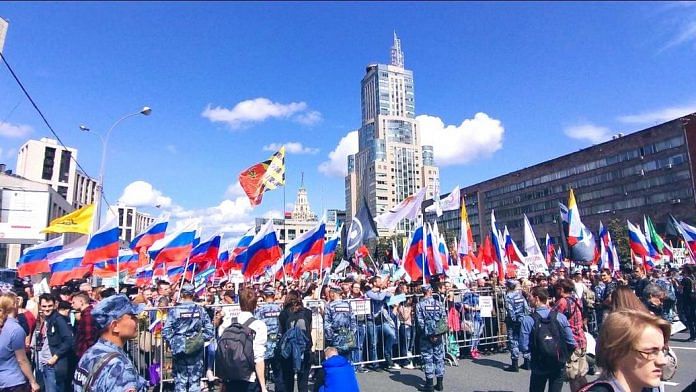Opposition candidates were disqualified for ‘irregularities’ in signatures
Over 20,000 people gathered in Moscow on 20 July to protest the disqualification of opposition candidates from local Moscow elections.
Nearly all opposition candidates were disqualified for ‘irregularities’ in signatures in their petitions, such as misspelled personal information. Russian journalist and civil activist Serguei Parkhomenko said in a Facebook post that the election commission deliberately changed signatures to disqualify candidates.
The election commission requires that candidates collect 5,000 signatures to be eligible. Every person who signs has their personal information registered in a government database of opposition supporters, making citizens reluctant to openly support opposition candidates.
The elections for Moscow City Duma, the legislative body that passes laws and agrees on the budget for the Russian capital, will be held on 8 September. Moscow is Russia’s largest political centre, with 12 million people and a budget of $43 million.
Citizens plan to protest until the candidates are no longer disqualified, according to local media.
Protests may be growing more political
Rigged elections in Russia are not new. Last week’s protests were led by Alexei Navalny, Russia’s most prominent anti-corruption activist. Navalny helped organise the 2011-12 protests against the Russian election results, also known as the ‘Snow Revolution’. Several activists including Navalny were arrested, and in 2012 the government banned unauthorised protests and tightened regulations for political parties and the media.
The crackdown coincided with an increase in western economic sanctions, leading to economic stagnation and a declining quality of life. According to a study by the Centre for Economic and Political Reform, civic activists “retreated to local and socioeconomic issues” following the 2011-12 crackdown.
The most prominent protests since then have been over social issues, such as pension reforms that raised the retirement age and against construction of landfills that would pollute rivers.
According to the Carnegie Moscow Centre, authorities have viewed these as social issues and not symptomatic of a growing unrest and discontentment with the government. Agitators blame Moscow for these issues and protests increasingly call for the resignation of government officials.
Public outcry has forced Russian President Putin to make some concessions such as reducing the proposed retirement age after the pension protests and releasing investigative journalist Ivan Golunov after he was arrested on ‘drug charges’. Support for Putin has fallen from 80 per cent to around 65 per cent and he is not willing to risk further loss.
A majority of protests have not been political in nature or led to an increased support for the opposition. However, for the first time many of the opposition candidates who were disqualified in the Moscow City Duma elections had substantial majority in their respective districts. If they are allowed to run and win their districts, they will have the power to fundamentally shape the political agenda in Moscow.
Since Putin came into power, there has been an unwritten rule that citizens will sacrifice political participation for economic prosperity. Now that Putin is failing to deliver on that promise, civilians are increasingly willing to face the potential consequences of protesting and speaking out against the government.



